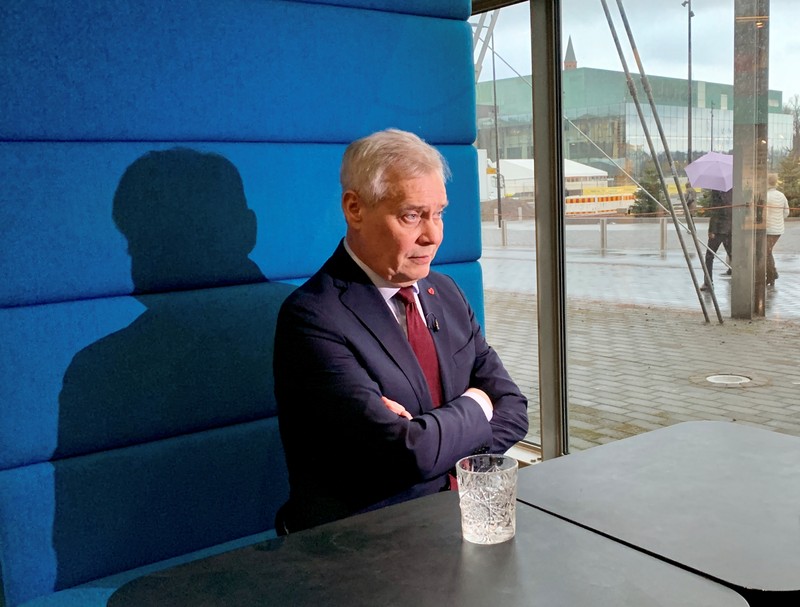
Social Democratic Party leader Antti Rinne listens during an interview in Helsinki, Finland April 9, 2019. Picture taken April 9, 2019. REUTERS/Attila Cser
April 12, 2019
(This April 11 story refiles to clarify that the Social Democrats have been in government as junior coalition partners during the last 20 years)
By Anne Kauranen
HELSINKI (Reuters) – Finland’s Social Democrats, who may win a general election for the first time in 20 years on Sunday, plan to raise taxes to fund the country’s generous welfare system as it struggles to cope with a rapidly aging population.
Antti Rinne’s Social Democrats have led in the polls for almost a year, with many Finns concerned over the future of public services and welfare due partly to the cost of caring for its growing ranks of pensioners.
“We need to strengthen our welfare society – and that needs money,” Rinne, a former union strong man, told Reuters in an interview ahead of parliamentary elections on Sunday.
He said raising taxes would also help combat inequality in Finnish society.
The last time the left-leaning Social Democratic Party (SDP) won a general election was in 1999, although it has been a junior partner in different government coalitions since then.
It topped the most recent opinion poll with 19.0 percent support, Finland’s public broadcaster Yle reported on Thursday. The party would still need to build a coalition to form a stable government.
“We need to spread our tax base and we need to strengthen it. That’s a big policy change here in Finland if we do that,” Rinne said.
The current center-right government’s policies have hurt the income of less privileged groups such as pensioners, families with children, students and the unemployed, Rinne said.
Since the last parliamentary elections, in 2015, centrist Prime Minister Juha Sipila has made preventing Finland from taking on more debt one of the government’s main goals together with pulling the country out of the three-year recession that eventually ended in late 2015.
Last year, Sipila’s government managed to cut Finland’s outstanding debt for the first time in a decade.
But the tight finances led to austerity measures and spending cuts such as reductions in unemployment benefits, pension freezes and cuts to public sector holiday pay, which made his government deeply unpopular.
“That’s not a fair way to do it,” Rinne said, adding he would adopt a different strategy to balance the public finances.
“We can collect a little bit over 1.5 billion euros more in taxes, but not via income taxes,” he said.
He suggested raising some consumption taxes as well as the capital gains tax, which now stands at 30 percent and at 34 percent for gains above 30,000 euros ($34,000).
Rinne’s talk of raising taxes is unlikely to drive off his supporters, many of whom value highly Finland’s huge welfare state.
A poll commissioned by the tax authority in 2017 found 79 percent of Finns were happy with their taxes, up 10 percentage points from a similar poll four years earlier.
One of Rinne’s election promises has been to increase all state pensions of less than 1,400 euros per month by 100 euros, a reform worth 700 million euros that would help “more than 55,000 pensioners escape poverty”, he said.
But taxpayers’ solvency might have its limits in the coming years, not only due to the increasing costs of caring for a rapidly aging population, but also because Finland will have to spend an estimated 7-10 billion euros on renewing its equally aging fighter jet fleet.
To Rinne’s disappointment, his party’s performance in the polls has declined in the weeks ahead of the election day, while the nationalist Finns Party has made significant gains, rising to second place, ahead of the SDP’s traditional opponent, the center-right National Coalition in the latest Yle poll.
If the SDP wins on Sunday, Rinne will have to team up with at least one of his main rivals such as the National Coalition’s chair and finance minister Petteri Orpo – who has called Rinne’s economic policies “irresponsible” – or with Sipila’s Centre Party, to be able to form a majority government.
Rinne has ruled out forming a government with the nationalists led by Jussi Halla-aho, an anti-immigration hardliner, who was fined by the Supreme Court in 2012 for blog comments linking Islam to paedophilia and Somalis to theft.
“My values are not similar to Jussi Halla-aho’s values, and it seems very difficult (for us) to be in the same government,” Rinne said.
($1 = 0.8871 euros)
(Reporting by Anne Kauranen; Additional reporting by Attila Cser; Editing by Hugh Lawson)

